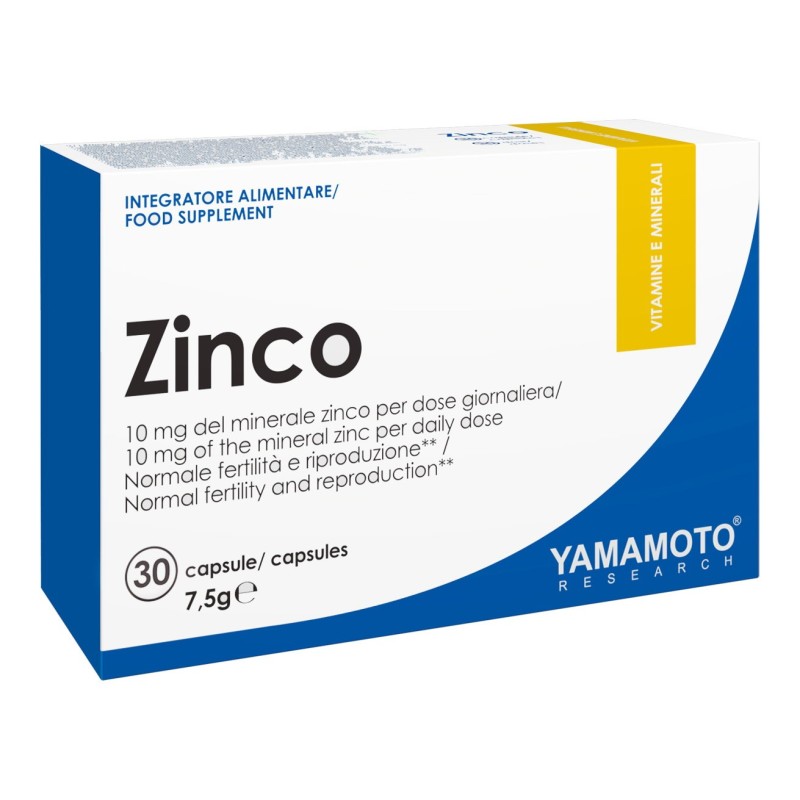- New


Free Shipping from 99€
The importance of zinc is often underestimated. It is no coincidence that over 80% of people lack this precious trace element. Zinc is present in the human body at levels of approximately 2 g, and is concentrated in the muscles, bones, prostate, eyes and skin, but can also be accumulated in the bones and spleen, where it is not readily available to the body. release when there are shortages. About 1% of the zinc present in the body is lost every day, mostly through the intestines and, to a much lesser extent, through urine and sweat. This precious mineral participates in a very large number of enzymatic processes as it plays an important role in growth and development, in neurological function, with a great impact on the immune response and growth. Over 300 enzymes depend on the presence of this element and among these there are some that participate in the synthesis of DNA and RNA, others that regulate growth and development processes, but also several that regulate the immune function or are involved in digestive and metabolic. For example, a very important enzyme containing zinc is carbonate dehydratase which allows the body to collect the carbon dioxide produced in the tissues and then eliminating it in the lungs. Its role is truly fundamental, given only how many activities it presides over. Zinc also plays an important role in guaranteeing the integrity of structural and membrane proteins, where its deficiency would expose them to a higher risk of oxidative damage and thus reduce their functionality. Its "structural" role is linked to the fact that it participates in the formation of "collagenases", enzymes responsible for the formation of collagen and its elimination when damaged. In the "protein" field, we recall that proteins containing zinc also participate in the regulation of the transcription processes of the genome, and it is involved in cell signaling processes and influences the release of hormones, positively influencing the activity of insulin. The amount of activities in which its presence is required is undoubtedly of great importance, but there are no real effective biological indicators to evaluate the nutritional status of zinc. In general, its concentration in plasma or serum is evaluated, but these are relatively not indicative values because they are not very sensitive to strong variations both during the day and due to inflammation, so the symptoms of a marginal zinc deficiency they are very inconspicuous and often overlooked. In children living in developing countries, for example, there is severe growth retardation and a greater susceptibility to infections. Other effects demonstrated due to a deficiency defined as "marginal" are the alteration or loss of the sense of taste, and delay in the healing processes.
Zinc supplements are available in various forms with not always optimal absorption capacity. The Zinc supplement is found in a chelated form such as Zinc Picolinate, the best choice for absorption by our body and therefore the most highly bioavailable.
The ZINC supplement is based on a formulation based on zinc of the "picolinate" type, the characteristic of which is that it is particularly bioavailable for our body.
Zinc is an essential mineral that acts as a catalyst in many enzymatic reactions in our body and is involved in DNA synthesis, immune function, protein synthesis and cell division.
It is a precious indispensable element also for the correct sense of taste and smell, in detoxification processes, in wound healing. It plays a very important role not only as an antioxidant by protecting cell membranes from oxidative damage, but by supporting our immune defenses in protecting against viruses, bacteria and fungi. This precious mineral is also involved in the production of hormones such as thyroid hormones (where a zinc deficiency prevents the conversion of T4 into T3), it also intervenes in the synthesis of male sex hormones such as testosterone,as well as for insulin, and thymulin.
It helps maintain the health of skin, hair and nails. Furthermore, it is of great importance for the development and healthy growth of children, promoting more efficient functionality of the immune system by contrasting bacterial and viral infections.
The mechanisms by which zinc physiologically exerts an antidiarrheal effect, but it appears that zinc therapy is useful in the treatment of acute or persistent diarrhea, is confirmed by many clinical trials, randomized and controlled, which demonstrate a reduction in the duration and frequency of diarrhea.
How to use: take 1 capsule a day with water.
do not exceed the recommended daily dose. Food supplements are not intended as a substitute for a varied diet. A varied and balanced diet and a healthy lifestyle are important. Keep out of the reach of children under three years of age. Product intended for adults. Keep in a cold and dry place. Avoid exposure to heat sources and sunlight.
Do you need help?